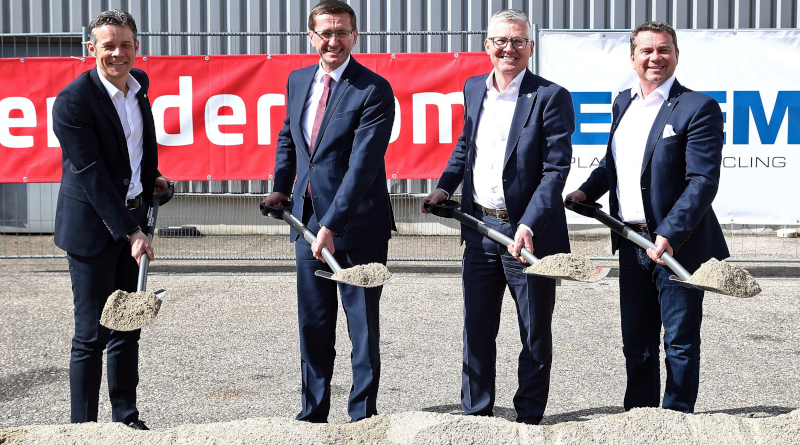Plastics recycling – from niche to trend: Erema establishes new R&D centre for innovative recycling technologies
Construction machinery rolls into action again at the Erema site in Ansfelden. The ground-breaking ceremony on April the 6th signals the start of work on a new R&D centre. Two halls with a total area of 1,550 square metres and a new office building with 50 workplaces will be built. The R&D centre will offer cross-departmental and cross-company test machines and laboratory for research and development of plastics recycling technologies to further advance the circular economy. Completion is scheduled for February 2023.
Focus on the highest possible recycled pellet quality
However, there is not just one recycling solution for all types of plastic waste, but rather different solutions depending on the type of plastic, the product and the application intended for the recycled plastic. “It makes a difference whether clean production waste is recycled and returned to the production process or whether printed and contaminated packaging materials collected in yellow bags are recycled and used to make food packaging again,” explains Markus Huber-Lindinger, Managing Director Erema Recycling Maschinen und Anlagen GesmbH. While some plastics processing loops, such as for PET bottles, have already been closed, many other plastic waste streams still require a great deal of R&D in cooperation with everyone involved in the value chain to produce recycled pellets that meet the very highest standards for the production of new products. More space will be available for this in the new centre.
R&D is decentralised at Erema. In recent years, approximately 5 percent of turnover was reinvested annually in research and development. Employees from different departments handle process engineering challenges, innovations in mechanical engineering and automation technology, and special technologies with a view to further improving the quality of recycled pellets. They also focus on new recycling technologies for waste plastic materials for which there is currently no satisfactory circular economy solution. The decisive factor here is also to exploit the potential of digitalisation.
For material tests, which are necessary for research and development work, an expanded machine park will be available following completion of the new R&D centre. Here, the recycling process can be evaluated end-to-end, including upstream and downstream processes such as shredding and further processing of the recycled pellets. The material tests are supported by detailed analysis in the professionally equipped laboratory, which will be relocated to the new premises and upgraded where necessary with the very latest lab equipment.
“With the new R&D centre, we are laying the foundation for further important plastics recycling milestones from Erema. We have always been characterised by our innovative strength, as proven by 115 patent families with more than 1,000 patents. And we will continue to lead with our pioneering role,” says Markus Huber-Lindinger. Regarding cooperation within the industry, Erema benefits from the plastics know-how in science and industry that is so focused in Upper Austria, as well as from the support provided by the Upper Austrian state as part of the Upper Austrian business and research strategy “#upperVISION2030”.
“The necessity of investing in the circular economy and in plastics recycling is clear from the current crises, which will be with us for some time to come,” adds Manfred Hackl. “Both corona and the consequences of the invasion of Ukraine have shown us the reality of the EU’s dependence on resources. Our mission “Another life for plastic. Because we care.” is more relevant today than ever before.”
CAPTION: From the left: Markus Huber-Lindinger Managing Director Erema GmbH, Markus Achleitner Upper Austria´s Minister for the Economy, Manfred Hackl CEO Erema Group GmbH and Christian Partoll Ansfelden´s Mayor. (Copyright: Land OÖ/Kauder)

